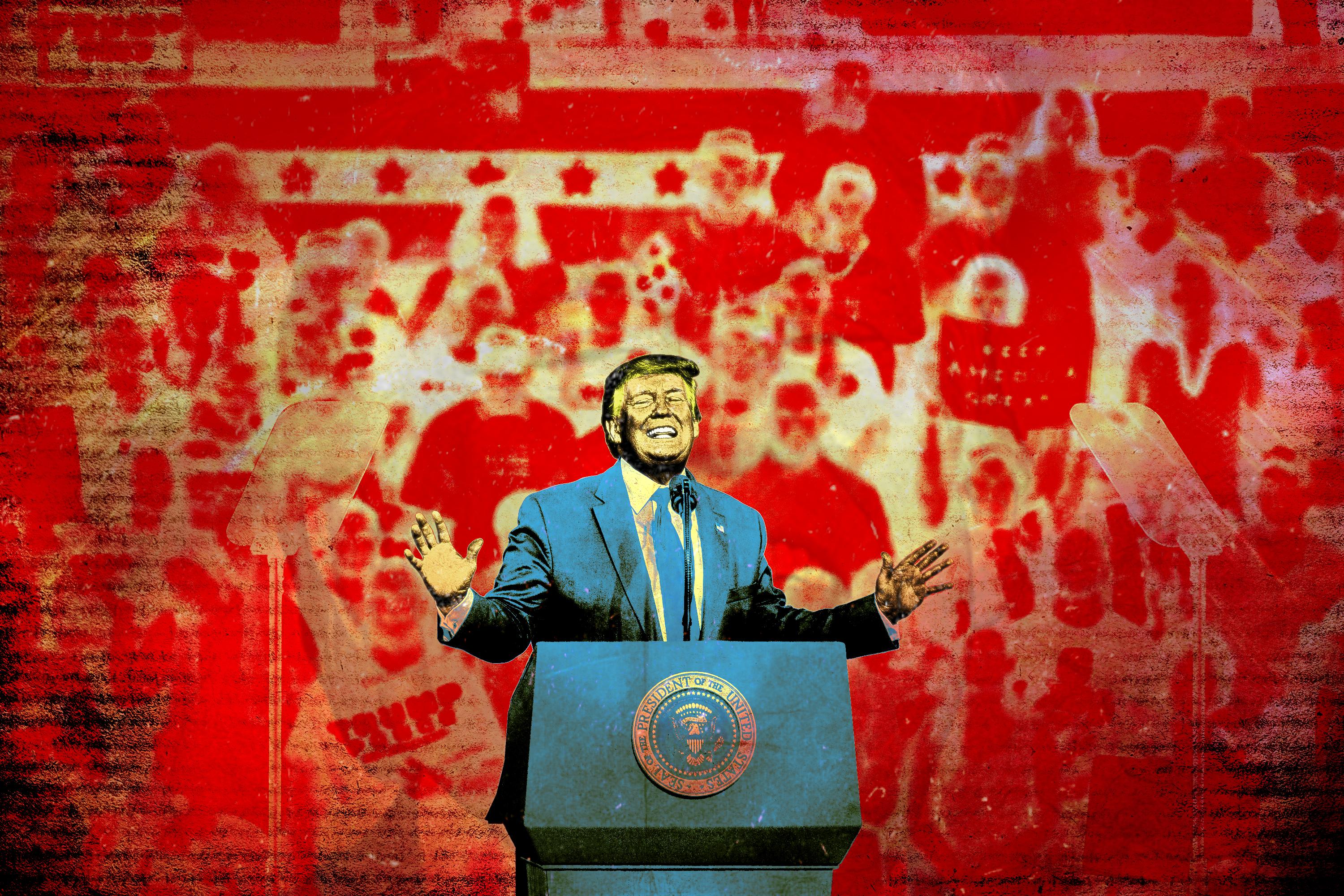
Last Wednesday, Donald Trump led a campaign rally in Greenville, North Carolina. The regularly scheduled Trump worship followed a week largely defined by Trump’s tweets telling four House Democrats—Ilhan Omar, Alexandria Ocasio-Cortez, Rashida Tlaib, and Ayanna Pressley—to “go back and help fix the totally broken and crime infested places from which they came.” Omar was born in Somalia, and the other three House Democrats are U.S. citizens since birth, but they’re not white; this dispute of their citizenship recalled Trump’s pre-presidential quest to prove that Barack Obama was, in fact, a citizen of Kenya. In Greenville, Trump vilified the four House Democrats for several minutes, and the Greenville crowd answered the president’s rant about Omar by chanting, “Send her back!”
Once again, Trump’s rallies bring out Trump’s worst impulses toward vulgarity, racial prejudice, and authoritarianism. These qualities are Trump’s weaknesses as well as his strengths: Most voters disapprove of the president for the very same reasons the people cheering at his rallies adore him. In exaggerating his vices, Trump exaggerates the contrast between two mismatched political parties. The 2020 Democratic primaries are a spectacular interrogation of all the left’s tensions of the past half century. They also underscore the opposition party’s chaotic uselessness in opposing the president, who now enjoys a 90 percent approval rate among Republican voters despite his unpopularity among everyone else.
Of course, “Send her back!” recalls the old “Lock her up!” chants about Hillary Clinton, which, in retrospect, memorialized the distinct passions that defined the 2016 presidential election. Alex Jones, Michael Flynn, and the Republican National Convention popularized the “Lock her up!” chant, and Trump answered the viral refrain during the second 2016 presidential debate when he told Clinton, “You’d be in jail.” Three years later, Trump’s core supporters have workshopped another grim slogan about Omar. Trump has politely disavowed the slogan, saying he “felt a little bit badly about it,” while nonetheless praising the chanters as “incredible patriots.” They are, after all, the voters whose enthusiasm must suffice to re-elect Trump despite the president’s broad and unrelenting unpopularity among the general populace. “Send her back!” or bust.
Trump’s rallies are unlike other presidential campaign rallies. His stump speeches are conventional campaign rhetoric on paper, but the president is notoriously eager to antagonize any press and protesters in attendance. The local intimidation feeds the national illusion: Trump’s political base is big, buff, and unconquerable. But Trump’s rallies are his only refuge in an otherwise weak and disastrous presidency. Between the two presidential campaign seasons, Trump has led more than 70 rallies. He campaigns permanently, and so it’s tough to discern where, exactly, his 2016 campaign ends and his 2020 campaign begins. The key difference between then and now is Trump’s belated domination of the Republican establishment: Congressional Republicans are now eager to defend Trump’s most extreme and belittling provocations, including his statements about Omar.
For all his dysfunction in the presidential context, Trump remains a masterful campaigner, especially in contrast with the 25 Democrats who are scrambling for their party’s presidential nomination. Trump, as president, commands the bully pulpit, though Teddy Roosevelt, who coined the term, didn’t mean “bully” in the modern sense which Trump embodies now. Trump doesn’t exploit the presidency to address the largest possible audience from the highest office on the planet. Instead, Trump addresses a cult from his quasi-godhood status among the so-called deplorables. By design, Trump’s rallies could not be any more offensive to a general audience. In polling, Trump loses broad public support for indulging the right-wing elements which the president’s rallied fanatics love. USA Today/Ipsos found 68 percent of poll respondents described Trump’s recent tweets as offensive and 59 percent described them as “un-American.”
But the Democrats have struggled to match Trump’s clarity, much less his energy, in the summer months of the 2020 presidential campaign. Joe Biden, the front-runner, draws small crowds. Sanders leads the largest Democratic presidential campaign rallies, though he’s sagging toward third place in recent polls. The Democratic primary debates have subjected a couple of dozen candidates to absurd micromanagement in the press; CNN and NBC have ranked the candidates by lottery and divided them into different teams for the televised Democratic primary debates. It’s been a tedious and humiliating season for everyone involved so far. In Congress, Democrats spent the past couple of months arguing among themselves, unproductively, about impeaching Trump and censuring Ocasio-Cortez, Omar, Tlaib, and Pressley.
Trump obscures the Republican Party’s divisions through brute force of personality. “I keep hearing how much enthusiasm is in the radical left,” Trump told his Greenville audience. “I don’t think they have enthusiasm. They’re just fighting with each other. We have all of the enthusiasm.” Once again, Trump exaggerates his public support, but he’s not lying about the rallies in particular. For Trump’s critics, Trump’s rallies contain a dark and dangerous enthusiasm. The rallies, as arrogant spectacles, defy all sensible assessment of Trump’s unpopularity. Trumpism may be a losing faction, in the long term, but the arenas are packed and the chants are as vulgar and victorious as ever.

